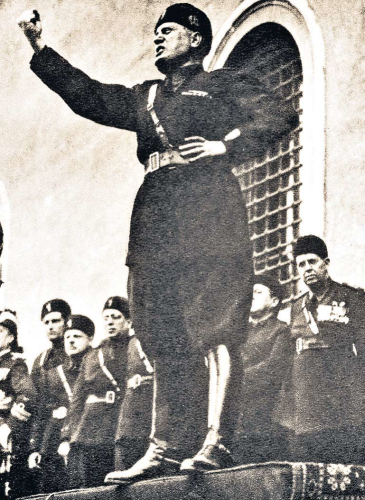Source: The Times 2022-10-03

Mussolini ‘was backed by Britain’
UK money helped to propel the dictator to power, Sir Samuel Hoare went on to claim
Benito Mussolini’s seizure of power in Italy in 1922 was secretly assisted by the British government, betting on the fascist dictator to protect its interests in the Mediterranean, a new book claims (Tom Kington writes).
Backed by violent gangs of blackshirts, Mussolini set up a fascist regime in Italy in the 1920s, banned Jews from public life in the 1930s and sided with Hitler in the Second World War before he was lynched by partisans in 1945.
Although he battled the British in Africa during the war, archives show Mussolini partly owed his rapid rise to British officials who helped organise his 1922 march on Rome, said Giovanni Fasanella, co-author of Nero di Londra.
“The British helped orchestrate the march and propel Mussolini to power because they wanted to make him the key figure in a government which would be useful to them,” he told The Times.
Thousands of Mussolini’s followers descended on Rome on October 28, persuading Italy’s king, Vittorio Emanuele III, to ask him to form a government.
Documents from the UK National Archives reveal the then British ambassador to Italy, Sir Ronald Graham, was in touch with march leaders as they gathered days earlier in a palazzo in Perugia owned by Romeo Adriano Gallenga Stuart, a half-English aristocrat the book claims was an informant for British intelligence.
During the march, Graham cabled London to say one of his secretaries was being “constantly” updated by the marchers. “We believe the ambassador was giving the fascists useful advice,” said the book’s second co-author Mario José Cereghino.
British officials were hoping to use Mussolini to give them a strategic edge over rival powers.
According to recently released documents, Sir Samuel Hoare, who knew Mussolini while head of British intelligence in Rome between 1917 and 1918, later claimed UK money was used to “form the fascist party and to finance the march”.
After the 1922 march Graham met Mussolini and sent London a glowing report of Mussolini’s “discipline”. Cereghino said his career between 1917 and 1922 “would not have taken the path we know without the influence of the British conservative establishment.”
Nero di Londra will be published this week as Mussolini returns to the spotlight after the election victory of Giorgia Meloni’s Brothers of Italy party, which evolved from the postwar fascist MSI party.